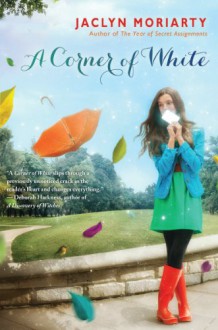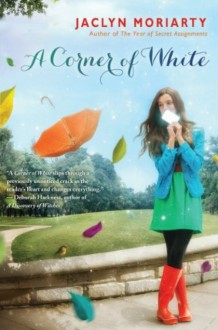
***Note: this review assumes that you've read the book.***
One-sentence summary: A charming parallel-world fantasy that by itself is not much of a story, but lays a fun foundation for the sequel.
What's great. I really enjoyed the language in this book, the oddness, and the playful narration. The Colors are an interesting new fantasy device, and I'm looking forward to seeing what Moriarty does with them (my hunch is that they're misunderstood as a malevolent force, but who knows). The Kingdom of Cello, dumb name and all, is delightful, in a fairy tale way.
First-Book Syndrome. I thought the pacing was off. It suffers in the way THE RAVEN BOYS did--but even more so--where this first volume is setting the groundwork for the series, and there's a slow, world-building start. This poses no problem a few years from now, when readers will be able to gobble up all the books in a row, and the overall pacing across books will feel appropriate. But for now, when it's essentially a standalone, we really needed to get to the letters between Madeleine and Elliot sooner, and to the issue of people being abducted to the other side. The real action of the book happens all at the end, with a sudden revelation that's a bit deus ex machina. (The seamstress, Clover, has been friends with Princess Coe all these years, and has also been watching Elliot's note-exchanging from her front porch. Couldn't the groundwork for that have been laid earlier? Clover takes it upon herself to tell Coe that Elliot had a friend in The World--just "guessing" that Coe will need Elliot's World contact more than she'll want to enforce the law.) There was a sort of unraveling of the plot from the mouths of characters toward the end of the book, a bit like an Agatha Christie mystery, when Miss Marple or Hercule Poirot explains the whole thing. We learn from conversations rather than from action that Mishka and Olivia were hostiles, Mishka abducted Abel Baranski into The World, the Twicklehams had abducted Derrin to be their fake daughter, Madeleine's dad was a drunk, the entire royal family has been abducted, Coe is really bright and Jupiter is really the stable boy, etc. Everything is explained, but after so many pages of slightly pointless Cambridge stuff in the beginning of the novel, I wish these plot points had unfolded slowly. This book planted some seeds that promise to come to fruition in the second volume, but none of them grew here past tiny seedlings.
Lack of Character Depth. The fairy tale aspect, while immensely charming, is something of a double-edged sword in that it keeps us at a distance from the characters. Though Madeleine was smart, she felt dreamy and a bit lost in The World. Perhaps this "other-worldness" of her character will come to play in later books (her background is mysteriously veiled), but I never felt her depth. This, even though she has a nice fascination with colors and Isaac Newton, and even though her mother's serious illness should lend richness to her personality. Also, her relationship with Jack felt cold to me (and Belle's convenient case of mono just so that Jack and Madeleine could get together felt forced). Why was that romance in the novel? Somehow Jack and Belle felt more real to me than Madeleine, even though they had less air time--and in general they were all a bit cutsie in the way that JK Rowling sometimes fashions characters (quirky and highly entertaining but with little depth). Elliot was cool, (maybe too cool in that hot-YA-guy way), but I loved his relationship with his mother and devotion to his dad and was glad that he found Madeleine to be a bit insufferable and didn't fall for her via their long distance correspondence (yet). Thank goodness we don't have a clumsy Bridget-Jones girl winning the greatest guy in two parallel dimensions. At least so far.
Characters grow when they solve their own problems. Speaking of Elliot, and disappointment in the lack of a real story arc, and how to make characters grow and change: Elliot spends the early part of the book wanting to search for his dad but being thwarted, he spends the middle part coming to terms with the real possibility that his dad simply ran off with a pretty young woman whom he'd become intimate with, and then LUCKY HIM it turns out his dad really was a good guy taken against his will. Similarly, Madeleine is annoyed by her mother's odd behavior, becomes alarmed by it, fails to get her to a doctor, and then her mother proves to be truly very ill. Madeleine only has to struggle with this genuinely catastrophic situation for a couple of days before LUCKY HER the Butterfly Child makes some healing beads and ALL BETTER. Neither of these threads provides a real story arc for the character. They feel pointless for us in a literary sense, given the way they resolve themselves: that is, the characters have their personal devastation lifted from them through no effort of their own. (Elliot will still have to find his dad, but he himself says that the fact that his dad is missing or dead is in some ways easier to live with than his being a scoundrel.)
Not a bleak dystopia. It's appropriate that this book is getting attention, though. I don't think it's of award-winning caliber as a standalone, but it's a rare addition to a slim genre: a wholesome, fun fantasy without paranormal creatures or heavy, miserable dystopia; a book that includes Isaac Newton, a little science, and kids who study auras and astrology for fun. It can be particularly hard for teen readers to find lighthearted fantasy novels like this.
In sum, this is a sweet, different kind of book, and I like that a lot.


 Log in with Facebook
Log in with Facebook 









